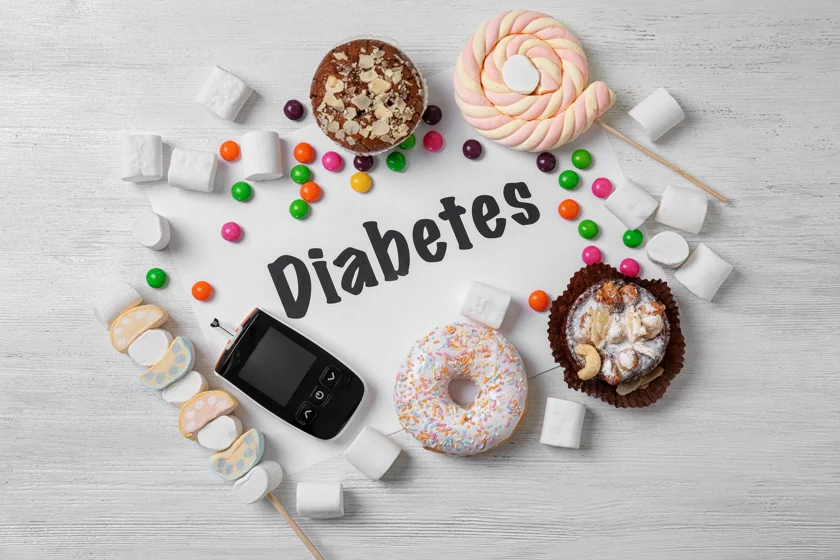Effective Blood Sugar Control for Diabetics
Effective blood sugar management is critical for diabetics to prevent complications and ensure overall health. Consistently high blood sugar levels in diabetics can cause serious health issues, including nerve damage, heart disease, and vision problems. A particularly concerning complication is diabetic foot issues, which can result in ulcers or infections that are difficult to heal and in extreme cases, may even lead to amputation. Maintaining optimal blood sugar control is key to reducing these risks.
Surat Diabetic Foot & Ulcer Clinic provides specialised services to help diabetics manage their blood sugar levels effectively. From personalised medication for sugar diabetes to lifestyle counselling and educational resources, the clinic’s comprehensive approach is designed to support patients in their journey to better health and diabetes management.
Why is blood sugar control Crucial for Diabetics?
Diabetes and Foot Health
Blood sugar control is essential for preventing various complications, especially for diabetic foot health. When blood sugar remains consistently high, it can lead to nerve damage, known as neuropathy, which affects sensation in the feet. Reduced sensation can make it difficult for diabetics to notice small injuries, which can lead to infections or ulcers that heal slowly due to poor circulation.
Complications from High Blood Sugar
High blood sugar levels in diabetics contribute to delayed wound healing, which heightens the risk of infection. These complications make effective blood sugar management crucial, as they directly impact quality of life and overall health. Regular diabetic foot care and blood sugar monitoring play a significant role in reducing these risks and keeping feet healthy.
Recognising the Signs of High Blood Sugar
It’s important to recognise the symptoms of high blood sugar to take timely action. Here are common signs to look out for:
- Frequent urination: High blood sugar causes the body to attempt to flush out excess glucose, leading to increased urination.
- Increased thirst and hunger:As the body loses fluids through frequent urination, it tries to compensate by signalling thirst. High glucose levels also cause persistent hunger.
- Fatigue:High blood sugar can lead to feelings of tiredness, making daily activities difficult to perform.
- Blurred vision:Excess glucose can make the lens of the eye swell, causing temporary blurred vision.
- Slow-healing wounds:Due to impaired circulation, injuries or wounds in diabetics may take longer to heal, increasing infection risk.
Early identification of these signs is crucial in maintaining control and preventing severe complications. The Surat Diabetic Foot & Ulcer Clinic encourages patients to monitor their symptoms and consult a healthcare provider if symptoms persist, as timely medical attention can help manage and prevent complications.
When to Seek Medical Attention
In cases where high blood sugar persists despite diet and lifestyle adjustments, it’s essential to seek medical help. Indications that medical attention is needed include:
- Consistently high blood sugar despite adhering to Blood sugar control tips and prescribed medications.
- Difficulty in lowering blood sugar through lifestyle changes alone.
- Recurring infections or injuries, especially on the feet, that do not heal properly.
Regular diabetic check-ups at the Surat Diabetic Foot & Ulcer Clinic help address these concerns. Early intervention can help patients avoid complications and improve overall diabetes management. Working closely with healthcare providers ensures that blood sugar levels are monitored and any issues are managed effectively.
Treatment Options at Surat Diabetic Foot & Ulcer Clinic
The Surat Diabetic Foot & Ulcer Clinic offers a range of treatments to assist patients in maintaining optimal blood sugar levels:
- Medications: The clinic provides tailored medication for sugar diabetes, including insulin and oral hypoglycemic agents, based on each patient’s condition.
- Blood Sugar Monitoring: Regular monitoring, either through glucometers or Continuous Glucose Monitors (CGMs), helps patients stay informed of their blood sugar levels.
- Lifestyle Counselling: - Specialists at the clinic offer guidance on balanced diets and exercise, which are crucial for sugar control.
- Patient Education: - Educational resources and workshops empower patients with self-management skills, helping them understand how to better manage their blood sugar levels.
These services are designed to provide comprehensive support to patients, enabling them to lead healthier lives with effective blood sugar control.
Top Foods for Maintaining Healthy Blood Sugar Levels
Diet is a powerful tool in managing blood sugar. Here are some best foods for blood sugar control:
- Low GI Foods: -Foods with a low Glycemic Index (GI) release glucose slowly, helping to prevent spikes. Examples include whole grains, beans, and non-starchy vegetables like spinach and broccoli.
- Fruits and Vegetables:- Low-GI fruits, such as berries, apples, and citrus fruits, are good options for diabetics when eaten in moderation. Limiting high-sugar fruits or pairing them with protein can further help in control over sugar levels.
- Nuts and Seeds: - Almonds, walnuts, chia seeds, and flaxseeds are packed with healthy fats and fibre, making them beneficial for blood sugar stability.
- Legumes and Garlic: -Legumes like beans, chickpeas, and lentils are excellent sources of fibre and protein. Garlic also has properties that help regulate blood sugar levels and can be incorporated into daily meals.
Incorporating these foods into a daily diet aids in blood sugar control and can make a significant difference in managing diabetes.
Lifestyle Tips for Effective Blood Sugar Management
In addition to diet, lifestyle changes for diabetes are essential for maintaining optimal blood sugar:
- Exercise: Physical activity, such as walking, helps to control sugar levels by improving insulin sensitivity. Aim for 30 minutes of moderate exercise most days to help keep blood sugar stable.
- Diet: Planning balanced meals with controlled portions and nutrient-dense foods is vital for maintaining control over sugar levels. Choosing foods with low glycemic impact helps prevent spikes in blood sugar.
- Stress Management: -High stress can lead to elevated blood sugar. Techniques such as deep breathing, meditation, or engaging in hobbies can help reduce stress and support better blood sugar stability.
Adopting these lifestyle changes for diabetes promotes effective blood sugar management and a healthier lifestyle, contributing to long-term wellness for diabetics.
Conclusion
Effective blood sugar control is vital for preventing complications and ensuring a healthier life for diabetics. The Surat Diabetic Foot & Ulcer Clinic is dedicated to supporting patients through comprehensive care, including personalised treatment plans, medications, and education for self-management. Our team is here to help you achieve stable blood sugar levels and improve your overall quality of life.
For a personalised consultation, reach out to the Surat Diabetic Foot & Ulcer Clinic today. Take the first step toward better blood sugar management and a healthier you.
FAQs
Why is blood sugar control important for diabetics?
Maintaining optimal blood sugar levels is crucial to prevent complications like neuropathy, heart disease, and infections. Blood sugar control also helps reduce the risk of diabetic foot problems and promotes overall health.
What foods help to lower blood sugar levels?
Foods that help maintain stable blood sugar include low-GI options like whole grains, legumes, non-starchy vegetables, berries, nuts, and seeds. These foods release glucose slowly and prevent spikes.
How often should I check my blood sugar?
The frequency of checking blood sugar varies based on individual needs. Diabetics using insulin may need to check several times a day, while others may only need to monitor once daily or weekly. Consult with your doctor for personalised guidance.
Can lifestyle changes alone manage diabetes?
In some cases, lifestyle changes like diet, exercise, and stress management can be sufficient for managing blood sugar, especially in early-stage diabetes. However, many diabetics may still need medications or insulin, so it’s essential to follow a doctor’s advice.
What is best for sugar control?
The best way to control blood sugar is a balanced approach that includes a low-GI diet, regular physical activity, and consistent monitoring. Staying hydrated, managing stress, and following prescribed medications are also essential. Working with a healthcare provider ensures a personalised plan for effective sugar control.
How to control sugar immediately?
For an immediate drop in blood sugar, drinking water can help flush out excess glucose. Gentle physical activity, such as walking, can also help bring levels down. Avoid sugary foods, and monitor your blood sugar levels if you’re feeling symptoms of high blood sugar.
What is the best food to control blood sugar?
Low-GI foods like whole grains, leafy greens, lean proteins, and fibre-rich vegetables are ideal for controlling blood sugar. Beans, lentils, and foods high in fibre help maintain stable glucose levels throughout the day.
Is a 150 sugar level normal?
A blood sugar level of 150 mg/dL after a meal can be within range for some diabetics, but fasting blood sugar levels should ideally be below 100 mg/dL for non-diabetics and below 130 mg/dL for diabetics. Consult your doctor for personalised blood sugar targets based on your health condition.
Which fruit is best for diabetes?
Berries, cherries, and apples are great fruit choices for diabetics as they have lower sugar content and a low Glycemic Index. These fruits help in blood sugar control when consumed in moderation. Avoid high-sugar fruits or pair them with protein to slow down glucose absorption.
How to decrease blood sugar?
In addition to dietary changes, you can decrease blood sugar with regular exercise, proper hydration, and mindful eating. If lifestyle changes aren’t enough, consult a healthcare provider about medications or insulin.
What are 5 signs your blood sugar is too high?
The top signs of high blood sugar include frequent urination, increased thirst, fatigue, blurred vision, and slow-healing wounds. recognising these symptoms of high blood sugar early can prevent complications and encourage timely medical intervention.
What is normal blood sugar by age?
Normal blood sugar levels vary with age. For adults, fasting blood sugar should ideally be below 100 mg/dL, while post-meal levels should be below 140 mg/dL. Age-specific targets may vary for children, seniors, or those with health conditions; a doctor can provide specific ranges.
Are bananas good for diabetics?
Yes, in moderation, bananas can be part of a diabetic-friendly diet. Bananas have a moderate GI, so pairing them with nuts or protein can help prevent blood sugar spikes. Opt for small portions and choose slightly under-ripe bananas, which have a lower impact on blood sugar.
How can I control sugar levels effectively?
Controlling your sugar level involves a combination of balanced nutrition, regular physical activity, and consistent monitoring. Eating low-GI foods, staying hydrated, and avoiding sugary snacks are helpful strategies. Incorporating gentle exercises, such as walking, also aids in stabilising blood sugar. Consulting with a healthcare provider for personalised advice on medication for sugar diabetes and lifestyle adjustments can make managing blood sugar levels more effective.





.jpg)

